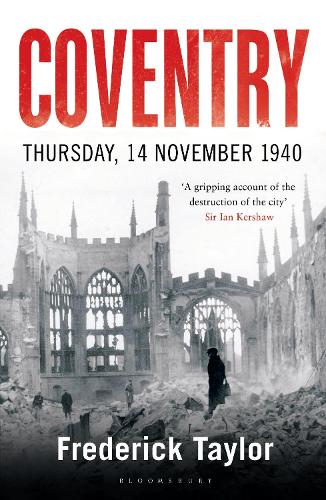
Coventry: Thursday, 14 November 1940
Publishing Details
Coventry: Thursday, 14 November 1940
By (Author) Frederick Taylor
Bloomsbury Publishing PLC
Bloomsbury Publishing PLC
26th October 2016
United Kingdom
Classifications
General
Non Fiction
Modern warfare
Air forces and warfare
European history
940.54211
Physical Properties
368
Width 126mm, Height 196mm, Spine 32mm
420g
Description
On 14 November 1940 the historic city of Coventry was subjected to the longest and most devastating air raid Britain had yet witnessed. After eleven hours of relentless bombardment by the German Luftwaffe, residents emerged from shelters to find their city obliterated and unrecognisable.
Yet the impact of the attack amounted to far more than physical ruin and loss of life. The Coventry raid marked a crucial moment in the Second World War, providing America with the final incentive needed to join forces and Britain with a blueprint for obliteration to be altered and turned against Germany. Seventy-six years on, acclaimed historian Frederick Taylor exposes the real impact of the Coventry bombings, drawing on extensive archive material and a mass of previously unreleased BBC eye witness recordings. He exposes the truth behind the conspiracy theories and lays out in chilling detail how this momentous night of destruction changed the face of modern aerial warfare.
Reviews
Frederick Taylor is one of the brightest historians writing today * Philip Kerr, Newsweek *
Taylor is a great storyteller * Richard Evans, New Statesman *
Taylor has a fine eye for a telling detail * Richard Overy, Literary Review *
In narrative power and persuasion, he has paralleled in Dresden what Antony Beevor achieved in Stalingrad * Independent on Sunday, on Dresden *
Author Bio
Frederick Taylor was educated at Aylesbury Grammar School, read History and Modern Languages at Oxford and did postgraduate work at Sussex University. He edited and translated The Goebbels Diaries 193941 and is the author of four acclaimed books of narrative history, Dresden, The Berlin Wall, Exorcising Hitler and most recently The Downfall of Money. He is a fellow of the Royal Historical Society and lives in Cornwall.
